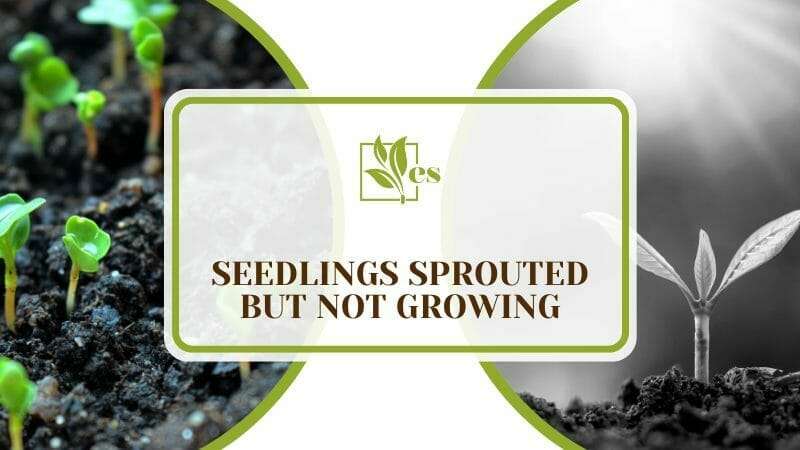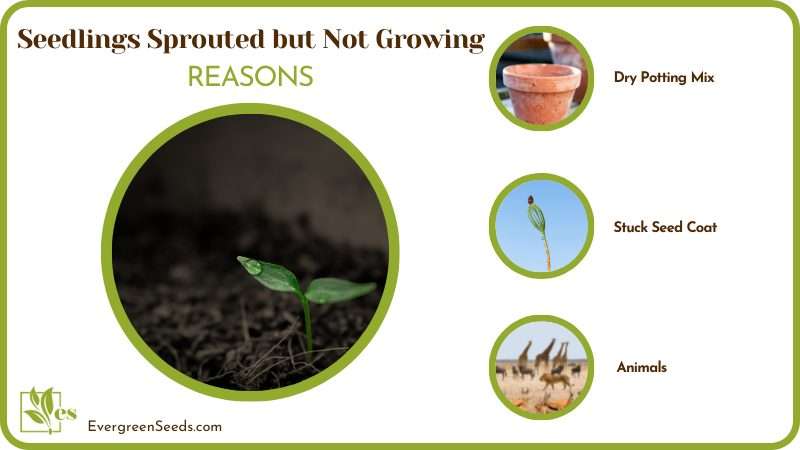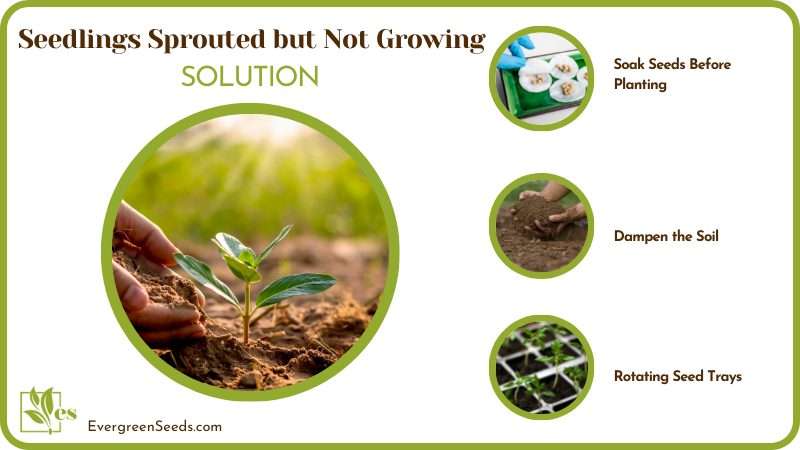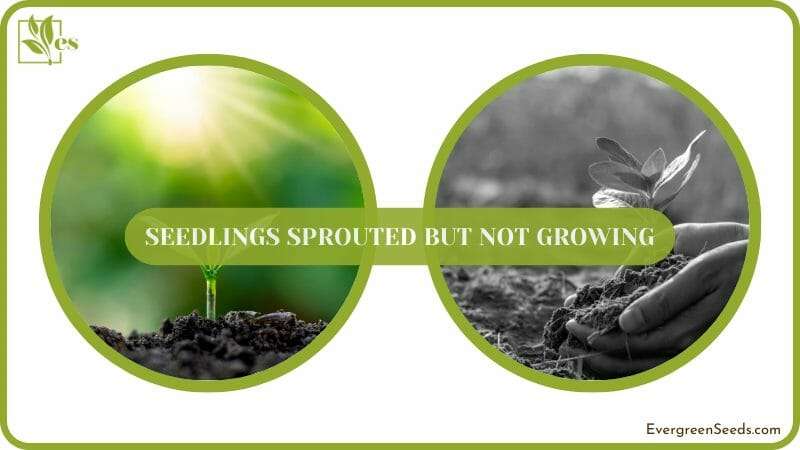Germination Seedlings sprouted but not growing is a worry most gardeners face in their hobbies as this might be a sign that something is wrong with the seedling’s growing environment.

In this expert guide, we will discuss the possible reasons for this problem, unravel the deeper problems at hand, and give you some quick fixes as well. Continue reading to know more.
JUMP TO TOPIC
Seeds Germinated but Not Sprouting
Dry potting mix, incorrect growing temperatures, or various diseases can be the cause of seeds germinating but not sprouting. There can be various reasons why seeds don’t necessarily germinate. Where some are beyond our control, a few others are just common gardening mistakes.
Let us learn about some common causes that prevent seeds from germinating.
– Dry Potting Mix
If your germinated seeds aren’t sprouting actively, check to see if the potting mix is dry. You need to keep the soil moist to allow seeds to sprout well. Remember, young sprouts do take in a lot of moisture, and dry soil can inhibit growth.
– Stuck Seed Coat
Seeds shed their outer coating after germination, allowing little sprouts to erupt. Sometimes the outer shell of seeds can remain on top and act as a barrier for little sprouts to crop up. Such a situation generally occurs if you have not planted the seed deep enough or if the soil is too dry.
– Seed Age
Poor quality and aged seeds often do not sprout well. You can do a simple check before you plant them by placing them in a plastic bag punctured with holes. Let it rest for a week, and if more than half of the seeds sprout, then you are good to go.
– Temperature Too Hot or Too Cold
You need to provide the seeds with an optimal temperature to be able to germinate. The soil temperature for most seeds needs to be between 65 degrees Fahrenheit to 75 degrees Fahrenheit. They fail to germinate when the temperature is either too cold or too hot for them. You can use a seedling heat mat or an alternative.
– Excess Water in the Soil
A soil soaked in water isn’t an ideal condition for freshly-planted seeds. In too much water, they could end up rotting.
At the same time, do not keep your soil bone dry as well. Work towards keeping the soil for germination lightly moist and not soaking wet.
– Planting Too Deep
A common reason for germinated seed not sprouting is when it is planted at the wrong depth. Seeds planted way too deep into the soil are seldom going to germinate. This is because the seed will require more effort and time to reach the surface to obtain light to grow.
At the same time, do not plant them right at the surface as this puts them at risk of damage with too much light, heat and pest menace.

– Disease
If you notice that your seedling stopped growing, check for pests or diseases. Pathogens thrive in wet conditions and can feed on and kill seeds before they can germinate.
– Animals
If you have a garden that welcomes birds, rabbits and deer, then be assured that your newly-planted seedbed can become a victim of havoc.
Prevent this from happening by planting a barrier that will prevent the animals from digging into the ground around the seeds.
– Seed Dormancy
Seed dormancy is a situation when seeds refuse to germinate because of the unsuitable environment they are in. Nature has a role to play here and many plant seeds are naturally tuned to germinate only in specific seasons. In all other seasons, they remain dormant.
If you have planted seeds tuned to germinate during spring, they may fail to do so in other seasons and remain dormant. However, once they come out of their dormancy, they stand a chance to germinate and sprout.
– Early Fertilizing
Plants require additional nutrition in the form of fertilizers at a later stage of growth. Do not fertilize the seedling in the early stage as this may hamper germination. It can even lead to the death of the seed before it sprouts.
The ideal time to fertilize is when you notice the first true leaves. You can also opt to sow seeds in vermicomposting soil remix that will give the plant moisture and support. You can try the 46-0-0 fertilizer or the 0-0-60 fertilizer if it suits you.
Why Do I See Seedling Stunted Growth?
You may see seedlings growing slow or stunted if you have neglected their water, nutrition and environmental requirements. Let us look at these factors in more detail below.
– Watering Problems
Overwatering and underwatering are the most common reasons for stunted growth. Too much water will prevent roots from developing healthily and the seedling may grow droopy with a wilted appearance.
Roots need enough oxygen in the initial stages of the plant, and excess water may hamper this. At the same time, underwatering can restrict growth as the plant seedling will struggle to cope with dry soil conditions. Tap water is more than enough for the seedlings, but make sure to purify it.
– Incorrect Pot Size
Closely related to your watering schedule, potting sizes can equally hamper the growth of your seedling. Small seedlings in big pots may create a situation of water logging around the roots.
On the contrary, a small pot for a seedling restricts the growth of roots. Do ensure pots have good drainage holes to allow the flow of excess water.
– Nutritional and Environmental Problems
If you find your seedlings not growing, check to see if they are receiving their nutrients. An incorrect growing medium can often be the cause of a lack of nutrition. Check the nitrogen levels as a deficiency here can hamper growth drastically.
Also, grow your seedling in an environment that is best suited for it. Requirements of pH, humidity and light vary from plant to plant.
– Temperature and Light
Seedlings don’t thrive in extremely cold and windy conditions. They not only develop stunted growth, but the leaves curl up and the tips turn inwards as well. Too much light can also affect the seedling, making them stunted and weak.
Create a greenhouse for the seedling where they can be in a cool environment and indirect light.
– Pests
Stunted seedlings can be a result of pests and diseases as well. Tender seedlings are generally more susceptible to pathogens such as fungi, roundworms and nematodes.
Fungal diseases not only stunt growth but can also cause leaf spots, wilting and curled leaves. The seedling can lose its vigor and eventually die.
Tackling Seedling Issues
It is not always possible to achieve a hundred percent success in seeds germinating well. However, we can still try to achieve the maximum using these easy tips and tricks.
– Soak Seeds Before Planting
Get most of your seeds to sprout by soaking them in water for 30 minutes before planting them in the soil. Soaking in water softens the outer coat of the seed, thereby permitting easy and quick absorption of moisture from the soil.
– Dampen the Soil
Dampen the soil lightly before you sow the seeds in them. Mix the soil well with water, avoiding any sogginess. Make sure the soil remains moist for a few hours after the seeds have been planted.
– Sow Them Deep
To prevent problems like a stuck seed coat or animal issues, plant the seeds in the soil at a depth of one to three inches.

– Choose the Right Time to Plant Your Seeds
The timing does matter and here is why. Planting seedlings during the late winters can kill them with unexpected frosts that may occur. On the other hand, doing it late in summers would mean they would not have enough time to mature into healthy saplings, so time your planting right.
– Avoid Overcrowding
Plants need space. They need a good airflow between them to grow and stay healthy. Thus, do not overcrowd your seeds, but space them out in your soil while planting.
– Rotating Seed Trays
If your seeds are initially sown in a tray, rotate them regularly. This will give all sections of the plant equal light and warmth from the sun. Rotate trays even if you are growing them under artificial light.
– Protect Them From Direct Sunlight
Place them under a sheet of protection or keep them in indirect light. Direct harsh sunlight can be harmful to the initial stages of the plant.













